Related Research Articles

An epigram is a brief, interesting, memorable, and sometimes surprising or satirical statement. The word is derived from the Greek ἐπίγραμμα epígramma "inscription" from ἐπιγράφειν epigráphein "to write on, to inscribe", and the literary device has been employed for over two millennia.
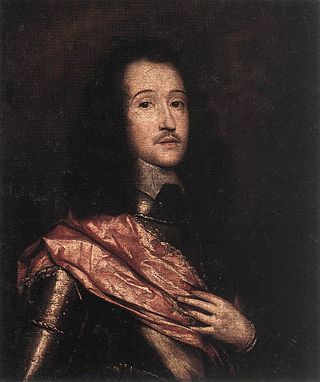
Richard Lovelace was an English poet in the seventeenth century. He was a cavalier poet who fought on behalf of Charles I during the English Civil War. His best known works are "To Althea, from Prison", and "To Lucasta, Going to the Warres".

Benjamin Jonson was an English playwright and poet. Jonson's artistry exerted a lasting influence upon English poetry and stage comedy. He popularised the comedy of humours; he is best known for the satirical plays Every Man in His Humour (1598), Volpone, or The Fox, The Alchemist (1610) and Bartholomew Fair (1614) and for his lyric and epigrammatic poetry. "He is generally regarded as the second most important English dramatist, after William Shakespeare, during the reign of James I."

Thomas Campion was an English composer, poet, and physician. He was born in London, educated at Cambridge, studied law in Gray's inn. He wrote over a hundred lute songs, masques for dancing, and an authoritative technical treatise on music.
This article contains information about the literary events and publications of 1679.

Scottish literature is literature written in Scotland or by Scottish writers. It includes works in English, Scottish Gaelic, Scots, Brythonic, French, Latin, Norn or other languages written within the modern boundaries of Scotland.
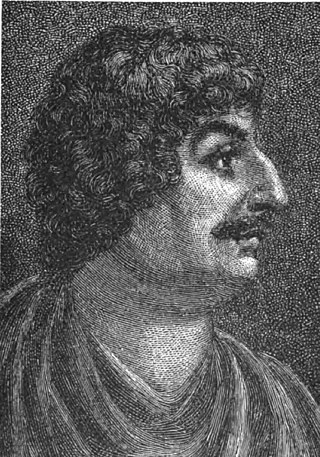
Robert Herrick was a 17th-century English lyric poet and Anglican cleric. He is best known for Hesperides, a book of poems. This includes the carpe diem poem "To the Virgins, to Make Much of Time", with the first line "Gather ye rosebuds while ye may".
British literature is literature from the United Kingdom of Great Britain and Northern Ireland, the Isle of Man, and the Channel Islands. This article covers British literature in the English language. Anglo-Saxon literature is included, and there is some discussion of Latin and Anglo-Norman literature, where literature in these languages relate to the early development of the English language and literature. There is also some brief discussion of major figures who wrote in Scots, but the main discussion is in the various Scottish literature articles.
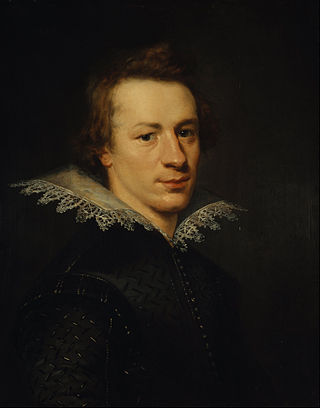
William Drummond, called "of Hawthornden", was a Scottish poet.
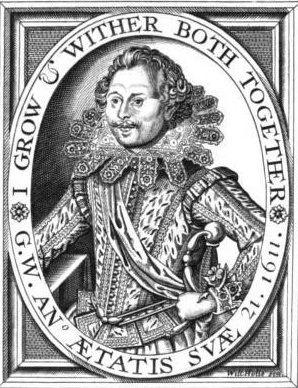
George Wither was a prolific English poet, pamphleteer, satirist and writer of hymns. Wither's long life spanned one of the most tumultuous periods in the history of England, during the reigns of Elizabeth I, James I, and Charles I, the Civil War, the Parliamentary period and the Restoration period.

Henry King was an English poet who served as Bishop of Chichester.
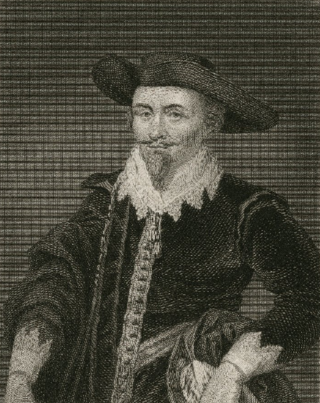
Richard Brathwait or Brathwaite was an English poet.
Nationality words link to articles with information on the nation's poetry or literature.
A compter, sometimes referred to as a counter, was a type of small English prison controlled by a sheriff. The inmates were usually civil prisoners, for example dissenters and debtors. Examples of compters include London's Wood Street Compter, Poultry Compter, Giltspur Street Compter and Borough Compter and the lock-up over the Abbey Gateway, next to St Laurence's church, in Reading, Berkshire.
Chaucer's influence on 15th-century Scottish literature began towards the beginning of the century with King James I of Scotland. This first phase of Scottish "Chaucerianism" was followed by a second phase, comprising the works of Robert Henryson, William Dunbar, and Gavin Douglas. At this point, England has recognised Scotland as an independent state following the end of the Wars of Scottish Independence in 1357. Because of Scottish history and the English’s recent involvement in that history, all of these writers are familiar with the works of Geoffrey Chaucer.
Samuel Collins (1576–1651) was an English clergyman and academic, Regius Professor of Divinity at Cambridge and Provost of King's College, Cambridge.

Literature in early modern Scotland is literature written in Scotland or by Scottish writers between the Renaissance in the early sixteenth century and the beginnings of the Enlightenment and Industrial Revolution in mid-eighteenth century. By the beginning of this era Gaelic had been in geographical decline for three centuries and had begun to be a second class language, confined to the Highlands and Islands, but the tradition of Classic Gaelic Poetry survived. Middle Scots became the language of both the nobility and the majority population. The establishment of a printing press in 1507 made it easier to disseminate Scottish literature and was probably aimed at bolstering Scottish national identity.

Poetry of Scotland includes all forms of verse written in Brythonic, Latin, Scottish Gaelic, Scots, French, English and Esperanto and any language in which poetry has been written within the boundaries of modern Scotland, or by Scottish people.

Scots-language literature is literature, including poetry, prose and drama, written in the Scots language in its many forms and derivatives. Middle Scots became the dominant language of Scotland in the late Middle Ages. The first surviving major text in Scots literature is John Barbour's Brus (1375). Some ballads may date back to the thirteenth century, but were not recorded until the eighteenth century. In the early fifteenth century Scots historical works included Andrew of Wyntoun's verse Orygynale Cronykil of Scotland and Blind Harry's The Wallace. Much Middle Scots literature was produced by makars, poets with links to the royal court, which included James I, who wrote the extended poem The Kingis Quair. Writers such as William Dunbar, Robert Henryson, Walter Kennedy and Gavin Douglas have been seen as creating a golden age in Scottish poetry. In the late fifteenth century, Scots prose also began to develop as a genre. The first complete surviving work is John Ireland's The Meroure of Wyssdome (1490). There were also prose translations of French books of chivalry that survive from the 1450s. The landmark work in the reign of James IV was Gavin Douglas's version of Virgil's Aeneid.
Richard Vennar was an English writer, known particularly for his attempt to stage his play England's Joy.
References
- ↑ Simoni, Anna E. C. (1978). "Bilingual poet: William Fennor, Alias Wilhelmus Vener, Enghelsman". Neophilologus. 62: 151–160. doi:10.1007/BF01514320.
- ↑ The Cambridge History of English and American Literature in 18 Volumes (1907–21). Volume IV. Prose and Poetry: Sir Thomas North to Michael Drayton. XVI. London and the Development of Popular Literature. § 23. Discoverie of the Knights of the Poste.
- ↑ John Nichols, Progresses of James the First, vol. 3 (London, 1828), pp. 97, 139-65.